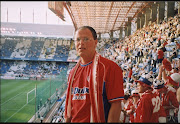 Harry Mulvey
Harry MulveyHarry Mulvey played for Shelbourne for six years between 1903 and 1905 and is best remembered for being ‘that feller on the end with the big moustache’ in old sepia photographs. Curiously, instead of wearing his moustache between his nose and mouth, as was the custom at the time, Mulvey wore it on his chin and would get annoyed if people referred to it as ‘a beard.’
Born into a large working-class Ringsend family (which surprised him, as his parents were very rich and from Tullamore) the left full back soon caught the eye of a number of scouts, until his father complained to the scoutmaster.
At fourteen, he signed apprenticeship terms with Bray Unknowns but couldn’t find his way to their training ground, despite asking directions from everyone he passed. Disillusioned, he considered joining the Navy until he discovered it meant he would have to go to sea.
It was legendary Shels supremo Joe “Joe” Hartigan, who first spotted Mulvey playing for junior league side Bray Even More Unknowns and liked the fearless, never-say-die attitude of the young left back. Indeed, although the wily old manager interviewed him for thirty minutes afterwards, he could still not get him to say the word ‘die.’
At the time, Shelbourne were of course playing in the Free State League (sponsored by the Black and Tans) and Harry Mulvey soon found himself pitting his wits against tricky right wingers from Linfield and Cork Wanderers, though not at the same time. He soon became a firm crowd favourite not just for his skill and bravery, but also for his habit of throwing money into the crowd every time the ball went out for a throw-in.
With Harry at left back, the legendary Shels back four of Wallis, Dingbat, Scrote and Mulvey was complete and they soon gained the reputation of being the meanest defence in the League, pretending to look the other way when the man with the Salvation Army collection tin came around. Opposition forwards got little change out of them, as they tended not to carry much money in their shorts. The “Shels back four” as they came to be known, in both verse and Braille, took no prisoners, mainly because it wasn’t their job.
In 1904, Shels came agonisingly close to landing the double when they narrowly avoided relegation and were knocked out of the Cup in the first round by the minnows of the competition, Littlefish Athletic. Harry missed most of the season with a splinter in his thumb and by the time he regained full fitness, his place had been taken by his namesake, Ernie “Ernest” Carbuncle.
A lesser man would have crumbled. Sadly, Harry was a lesser man and he did. Still, crumbling was a very respectable occupation in those days and it helped to supplement Harry’s income as he whiled away his time in the reserves.
He got his chance in the first team early the following season when Ernie Carbuncle’s leg fell off in a freak sliding tackle. This time, Harry never looked back, except when the ball went over his head. By all accounts, he played out of his skin that season, which many opposition players protested about, and Shels clinched the League on the final day of the season with a 3-0 win over Cork Incorruptibles with goals from Bumstead, Scrote and Khomeini (og)
Unsurprisingly, Harry was called up to the Ireland squad at the end of the season and took part in a tour of South America. The team didn’t play any matches – they just toured around looking at things – but Harry came home with three caps after a spot of souvenir shopping in Caracas.
The 1905 / 1906 season began poorly for Shels, with Bumstead becoming pregnant and the Freckleton twins, John and Johnny, leaving to join the priesthood. Dingbat was transferred to Accrington Stanley and Harry found himself playing alongside Scrote at the heart of the defence. The two men hadn’t got on since the unsavoury incident of the Werther’s Originals and famously ignored each other on and off the pitch, preferring to be caught in possession rather than play the simple pass.
The once-solid defence began to leak goals and the end was in sight for Harry. He finished the season in the reserves and was transferred during the summer to Cork Intractables for two shillings and a tin of Gold Flake.
He died in 1932 when he was stabbed by a Romanian priest at the Ecclesiastical Congress. His last wish was to be scattered over Shelbourne Park and this was dutifully carried out by his tearful family in a moving ceremony, in front of 20,000 old time Shelbourne supporters. As the Irish Times movingly wrote, “They should have cremated him first.”




No comments:
Post a Comment